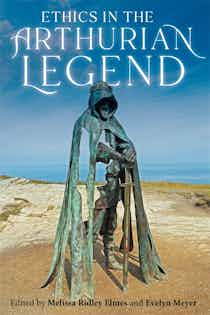Ethics in the Arthurian legend
 An interdisciplinary and trans-historical investigation of the representation of ethics in Arthurian Literature.
An interdisciplinary and trans-historical investigation of the representation of ethics in Arthurian Literature.
From its earliest days, the Arthurian legend has been preoccupied with questions of good kingship, the behaviours of a ruling class, and their effects on communities, societies, and nations, both locally and in imperial and colonizing contexts. Ethical considerations inform and are informed by local anxieties tied to questions of power and identity, especially where leadership, service, and governance are concerned; they provide a framework for understanding how the texts operate as didactic and critical tools of these subjects.
This book brings together chapters drawing on English, Welsh, German, Dutch, French, and Norse iterations of the Arthurian legend, and bridging premodern and modern temporalities, to investigate the representation of ethics in Arthurian literature across interdisciplinary and transhistorical lines. They engage a variety of methodologies, including gender, critical race theory, philology, literature and the law, translation theory, game studies, comparative, critical, and close reading, and modern editorial and authorial practices. Texts interrogated range from Culhwch and Olwen to Parzival, Roman van Walewein, Tristrams Saga, Sir Gawain and the Green Knight, and Malory’s Morte Darthur.
As a whole, the approaches and findings in this volume attest to the continued value and importance of the Arthurian legend and its scholarship as a vibrant field through which to locate and understand the many ways in which medieval literature continues to inform modern sensibilities and institutions, particularly where the matter of ethics is concerned.
zum Buch im ULB-KatalogPlus
zum Buch auf der Verlags-Website
Joy of the worm: suicide and pleasure in early modern English literature
Consulting an extensive archive of early modern literature, Joy of the Worm asserts that voluntary death in literature is not always a matter of tragedy.
In this study, Drew Daniel identifies a surprisingly common aesthetic attitude that he calls “joy of the worm,” after Cleopatra’s embrace of the deadly asp in Shakespeare’s play—a pattern where voluntary death is imagined as an occasion for humor, mirth, ecstatic pleasure, even joy and celebration.
Daniel draws both a historical and a conceptual distinction between “self-killing” and “suicide.” Standard intellectual histories of suicide in the early modern period have understandably emphasized attitudes of abhorrence, scorn, and severity toward voluntary death. Daniel reads an archive of literary scenes and passages, dating from 1534 to 1713, that complicate this picture. In their own distinct responses to the surrounding attitude of censure, writers including Shakespeare, Donne, Milton, and Addison imagine death not as sin or sickness, but instead as a heroic gift, sexual release, elemental return, amorous fusion, or political self-rescue. “Joy of the worm” emerges here as an aesthetic mode that shades into schadenfreude, sadistic cruelty, and deliberate “trolling,” but can also underwrite powerful feelings of belonging, devotion, and love.
zum Buch im ULB-KatalogPlus
zum Buch auf der Verlags-Website
